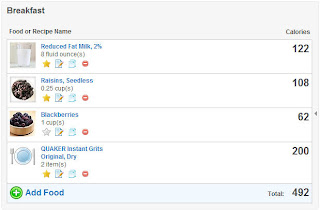After visiting his website, and his blog, I thought it would be a good idea to purchase his book "The Body Fat Solution"
One of the key nutrition advice he gives in his book is to maintain a food journal. According to Tom, you should write down everything you eat during the day. At first, I thought this was a bit much. Did he expect us to keep a book and a pencil to write down every time I put something in my mouth?
In retrospect, I should have followed his advice the very same day. Keeping a food journal is one of the key tools in your drive and success towards a healthier lifestyle. The reason is very simple. When it comes to our food intake, we always under estimate. For example, did you know that 1 tablespoon of olive oil contains 119 calories? Well, I had no idea how calorie dense this food is, until I started looking closely at the food that I was eating and the calorie contents of each food.
An excellent resource for figuring out your calorie intake is Calorie Counter Database. It has nutritional information on almost every food item.
Wouldn't it be nice if we could just type in the food that we have consumed during the day and somehow get a daily log of our calorie intake? As it turns out, there are plenty of free resources on the net that allow you to keep track of your daily food intake and shows you exactly where you stand in terms of your calorie requirements.
I started using one such tool provided by My-Calorie-Counter. Not only does the site allow you to keep a food journal, it also allows you to keep a blog.
The food journal keeps track of your daily food intake, and displays calories and other nutritional information against each item that you consume. You can even create your own food such as a home cooked ethnic dish that may not be available in the database. You will have to estimate the calorie contents of the food and (optionally) provide other nutritional information such as fat percentage, carbohydrates, proteins etc.
In addition to the food intake, the journal also allows you to keep track of your exercises and determines whether you are going over or under the daily allocated calorie budget.
I strongly recommend everyone who is serious about their heath to start keeping a food journal.

No comments:
Post a Comment